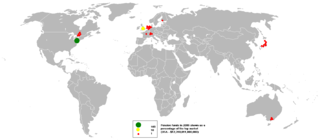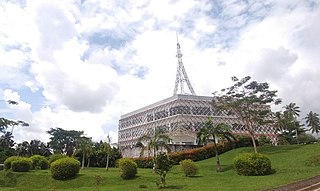
The free-market economy of Sri Lanka was worth $84 billion by nominal gross domestic product (GDP) in 2019 and $296.959 billion by purchasing power parity (PPP). The country has experienced an annual growth of 6.4 percent from 2003 to 2012, well above its regional peers driven by the growth of non-tradable sectors which the World Bank warned to be both unsustainable and unequitable and has slowed since then. In 2019 with an income per capita of 13,620 PPP Dollars or 3,852 (2019) nominal US dollars, Sri Lanka was re-classified as a lower middle income nation by the World Bank from a previous upper middle income status.

A pension fund, also known as a superannuation fund in some countries, is any plan, fund, or scheme which provides retirement income.

The Central Bank of Sri Lanka (CBSL) is the monetary authority of Sri Lanka. It was established in 1950 under the Monetary Law Act No.58 of 1949 (MLA), it is a semi-autonomous body, and following the amendments to the MLA in December 2002, is governed by a five-member Monetary Board, comprising the Governor as chairman, the Secretary to the Ministry of Finance and Planning, and three members appointed by the President of Sri Lanka, on the recommendation of the Minister of Finance, with the concurrence of the Constitutional Council.

The Sri Lanka Institute of Information Technology is a private non-profit degree awarding institute recognised under Universities Act, No. 16 of 1978 and established under Companies Act No. 07 of 2007 in Sri Lanka specialising in technology and management. It has two campuses and four regional centres, the main campus being based in Malabe and a Metropolitan Campus in Colombo.SLIIT is a member of the Association of Commonwealth Universities and International Association of Universities, and has several partnerships with international universities.

The Employees' Provident Fund Organisation (EPFO) is the government body that is responsible for running the largest mandatory state pension scheme in India. The EPFO assists the Central Board in administering a compulsory provident fund, pension and insurance plans for the Indian workforce. It also manages social security agreements with other countries. International workers are covered under EPFO plans in countries where bilateral agreements have been signed. As of May 2021, 18 such agreements are in place. The EPFO's apex decision making body is the Central Board of Trustees (CBT), a statutory body established by the Employees' Provident Fund and Miscellaneous Provisions Act, 1952 and under the jurisdiction of the Ministry of Labour and Employment. As of 2018, more than ₹11 lakh crore are under EPFO management.

Seylan Bank PLC is a publicly owned Commercial Bank in Sri Lanka. It has branches both in urban as well as rural areas of Sri Lanka. Seylan bank had 167 banking centres island wide, 3000 staff members, an ATM network of 205 units covering crucial locations, 9 branches providing 365 day banking in 2020. The bank was formed as a licensed commercial bank which was incorporated with a shareholder base.

Bernadine Rose Senanayake, JP, UM is a Sri Lankan politician, a former beauty queen and also an activist. She is the current Mayor of Colombo, and former Prime Minister's Spokesperson and the Deputy Head of the Prime Minister's Office for Ranil Wickramasinghe. She has been an activist on several issues and an active figure in the opposition gaining much limelight.

Employees' Provident Fund is a federal statutory body under the purview of the Ministry of Finance. It manages the compulsory savings plan and retirement planning for private sector workers in Malaysia. Membership of the EPF is mandatory for Malaysian citizens employed in the private sector, and voluntary for non-Malaysian citizens.

Ajith Nivard Cabraal is the State Minister of Finance, Capital Markets and State Enterprise Reforms since 12 August 2020. He is a former Governor of the Central Bank of Sri Lanka, holding the post from 1 July 2006 until his resignation on 9 January 2015. Cabraal is a Founder Member of the Sri Lanka Podujana Peramuna political party.
The banking sector in Sri Lanka is monitored by the Bank Supervision Department of the Central Bank of Sri Lanka under the Banking Act, Monetary Law Act and the Exchange Control Act.
The Committee On Public Enterprises (COPE) is a parliamentary committee established on July 21, 1979 by the Parliament of Sri Lanka.

Kulappu Arachchige Don Dhammika Perera, known commonly as Dhammika Perera is a Sri Lankan entrepreneur/business magnate and philanthropist, and Chairman/Managing Director of Vallibel One PLC. He is considered as a very successful investor which made him one of the richest persons in Sri Lanka. Dhammika is best recognized as an icon of expertise in corporate re-engineering and revival owing to his uncanny ability to choose his investment portfolio across sectors. He owns nearly 23 companies and regarded as a pioneer of Sri Lankan economic growth after the end of Sri Lankan Civil War. He is also known for frequently addressing the required policy framework for the country.
Ranee Jayamaha also spelt as Rani Jayamaha is a Sri Lankan economist, author and banker. She served as the chairperson of Hatton National Bank from 2011 to 2015. In addition, she is currently an advisor to the President of Sri Lanka in Banking and a former Deputy Governor of the Central Bank of Sri Lanka (2004–2009). She has also served as a member of the Insurance Board of Sri Lanka and a member of Securities and Exchange Commission.
Lakshman Arjuna Mahendran is a Sri Lankan born, Singaporean economist and banker. He is a former Governor of the Central Bank of Sri Lanka (CBSL), having been appointed by President Maithripala Sirisena in January 2015 and served until the end of his term in 30 June 2016. He was the former Managing Director of HSBC Private Bank, Chief Investment Officer of Emirates NBD as well as Chairman and Director-General of the Board of Investment of Sri Lanka. Mahendran is currently residing in Singapore, which has refused to extradite him on a request from Sri Lanka routed through interpol.
The Employees' Trust Fund (ETF), a social security programme, was established on 1 March 1981 under the Act No.46 of 1980 by the Parliament of the Democratic Socialist Republic of Sri Lanka to promote (i).employee ownership, employee welfare and economic democracy through participation in financing and investment (ii).employee participation in management through the acquisition of equity interest in enterprises and to provide for non-contributory benefits to employees upon retirement. All workers i.e. Permanent, Temporary, Casual, Contract, Piece-rate wages, Learners and apprentices who are employed in private and public sector are eligible to be benefited by it.
Cargills Bank Limited is a licensed commercial bank in Sri Lanka. It received its license from Central Bank of Sri Lanka to operate domestic and offshore banking business on 21 January 2014 and was ceremonially opened on 30 June 2014. At present the bank consists of 17 branches island-wide with the head office based in Kollupitiya.

The Sri Lanka Institute of Nanotechnology is a Sri Lankan research institute specializing in the field of nanotechnology. It was incorporated in 2008 as a public-private partnership between the Government of Sri Lanka and five private companies, and is notable for being the first public-private research institute in the country.
TKS Finance Limited is a Sri Lankan public limited company which worked as a licensed finance company accepting deposits from general public. It served as one of the licensed finance companies in Sri Lanka since commencing the operations in 2011. On 19 September 2019, Central Bank of Sri Lanka decided to cancel the license of the company due to insufficient capital and financial problems regarding repaying depositors' money on demand as well as before maturity.

The COVID-19 pandemic in Sri Lanka is part of the ongoing worldwide pandemic of coronavirus disease 2019 (COVID-19) caused by the severe acute respiratory syndrome coronavirus 2 virus. The first case of the virus in Sri Lanka was confirmed on 27 January 2020, after a 44-year-old Chinese woman from Hubei, China, was admitted to the Infectious Disease Hospital in Angoda, Sri Lanka. As of 12 May 2021, a total of 131,098 COVID-19 cases had been recorded in the country, 107,657 patients had recovered from the disease, and 850 patients had died.
Edirisinghe Trust Investments Finance Limited also popularly known as ETI Finance is a Sri Lankan private limited company as well as a non banking financial institution which worked as a licensed finance company accepting deposits from general public. The company's business was primarily based on lending money on gold securities. On 13 July 2020, Central Bank of Sri Lanka decided to cancel the license of the company due to insufficient capital and financial problems regarding repaying depositors' money on demand as well as before maturity.











